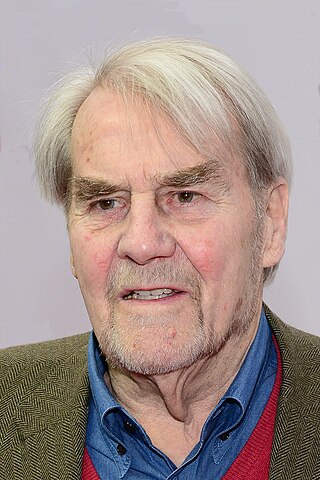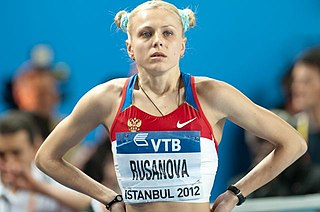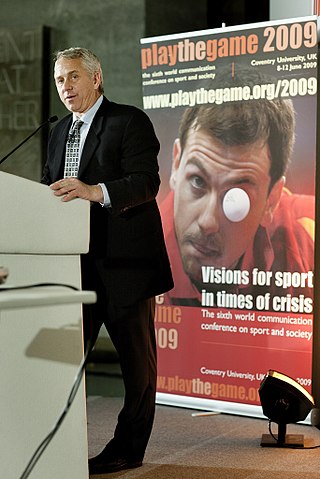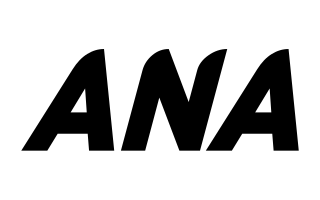Hajo Seppelt | |
|---|---|
 | |
| Born | 1963 |
| Occupation(s) | German journalist and author |
Hajo Seppelt (born 1963) is a German journalist and author.
Hajo Seppelt | |
|---|---|
 | |
| Born | 1963 |
| Occupation(s) | German journalist and author |
Hajo Seppelt (born 1963) is a German journalist and author.
Seppelt was born in West Berlin, and is the son of Alfred Seppelt, who was the head of the Berlin Chess Federation from 1984 to 2004.
In 1981, he obtained his college preparatory degree ( Abitur ) at the Beethoven High School in Berlin's Lankwitz neighborhood. He studied sports, social studies, journalism and French at the Free University of Berlin for a few semesters but did not complete a degree.
Since 1985, Seppelt has worked as a sports reporter for Germany's premier public broadcaster ARD. He has also worked for the Berlin public broadcaster Sender Freies Berlin and its 2003 successor Rundfunk Berlin-Brandenburg. After working for many years as a live commentary for swimming events for ARD, he was stripped of this duty in the early summer of 2006. Seppelt said that this was in reaction to a private email, in which he criticized ARD's uncritical reporting on doping, becoming public. Since 2006, he has worked as a freelance journalist for ARD and has made a number of reports and documentary films about doping.
Together with former Canadian swimmer Karin Helmstaedt, Seppelt made the documentary film Staatsgeheimnis Kinderdoping (State Secret Child Doping) about the perpetrators and victims of doping in East German swimming. It was broadcast by ARD. Together with Holger Schück, he published the book Anklage: Kinderdoping. Das Erbe des DDR-Sports (Indictment child-doping: The Legacy of East German Sports) in 1999. It also dealt with the topic of state doping in Communist East Germany.
In 2006, Seppelt reported extensively about the doping problem in cycling. Among other things, his research led to the identification of the German physician Markus China as a member of the doping network organized by Spanish doctor Eufemiano Fuentes. [1] In November of that year, he was awarded the Leuchtturm für besondere publizistische Leistungen (Lighthouse Prize for Special Journalist Achievement) by the journalists' association Netzwerk Recherche for his research, reports and exclusive revelations about cyclists Jan Ullrich and Floyd Landis and Eufemiano Fuentes. [2]
In the documentary "Mission: Clean Sport" Hajo Seppelt and Jo Goll documented the work of German doping control officers. The film highlighted flaws in Germany's doping-control system and caused heady public discussions, which contributed to structural changes in Germany's National Anti Doping Agency (NADA). The report won the Silver Chest Award 2007 at the International Television Film Festival in Plovdiv and the international Sports Movie and TV Award 2007 in Milan. [3] The film was also nominated for the German Television Prize and the Prix Europa .
In mid-January the German Skiing Association (DSV) took legal action, and a Hamburg court issued an injunction against Seppelt for refusing to make a cease-and-desist declaration demanded by the DSV about suspicions that German cross-country skiers and biathletes had engaged in blood doping in a Vienna laboratory. [4] A superior court in Hamburg overturned that ruling in Seppelt's favor, concluding that DSV had no right to demand the cease-and-desist declaration because it was not affected by the journalist's reporting. The ruling was based constitutional guarantees of journalist freedom in cases of anonymous sources. The judgement also overturned an injunction from 21 October 2008. [5] Seppelt's suspicion could not be proved after extensive investigations.
In January 2012 Seppelt and colleagues from the Western German public broadcaster WDR had reports featured on ARD and WDR sports programs about the blood of thirty athletes being exposed to ultra-violet radiation by a sports doctor in the Eastern German city of Erfurt. Several of the athletes concerned were named. In the wake of the broadcasts, a discussion arose as to whether such procedures were banned according to the World Anti-Doping Agency (WADA) code. WADA itself considered them to be. [6] Anti-doping investigations of the athletes ended up with discontinuations and acquittals due to extenuating circumstances, and a criminal investigation of the doctor concerned was also discontinued. Nonetheless, many experts declared that blood treatments were banned in principle by the laws governing sports. The doctor tried to get a superior court in Cologne to issue an injunction against WDR, [7] but the broadcaster won out, and the report was allowed to contain references to "forbidden blood treatments." [8]
Parallel with the 2008 Summer Olympics in Beijing, ARD broadcast the 45-minute-documentary Olympia im Reich der Mittel: Doping in China (Flying High in the Middle Kingdom: Doping in China), which Seppelt made with Jo Goll. The film reported about doping and doping controls in China, in particularly above proven case of stem-cell manipulation carried out on top athletes. [9] At the International New York Film Festival, it won a world gold medal for long-form reporting. It was also awarded the main prize at 2009 Sportfilm Liberec 2007 – World Facts Challenge festival. [10]
In the spring and summer of 2012, Seppelt and Kempe reported for the first time about doping among Kenyan track-and-field athletes. The focus was primarily on practices among doctors in the background. One athlete told of widespread doping among Kenyan long-distance runners. [11] [12] The reports caused intense reactions in Kenya and met with considerable international resonance. As a result, doping controls were stepped up in the country.
The documentary Doping – Top Secret: The Shadowy World of Athletics shows that it is relatively easy to obtain banned performance-enhancing drugs in Kenya. It traces the story of an impoverished young runner who seems to have died from the side effects of taking EPO.
Kenyan athletics authorities refused to speak with Seppelt about the issue, and his film presents circumstantial evidence of corruption among Kenyan sports functionaries. Former Boston marathon winner Rito Jeptoo asserts that Kenyan athletes are not subjected to blood tests while training. Another Kenyan runner claims that the national federation suppresses positive doping results in return for bribes.
Seppelt also suggests the International Association of Athletics Federations isn't doing enough to address the problem of doping in endurance disciplines. After evaluating data on athletes' blood collected at major athletics competitions over a number of years, two Australian scientists conclude that doping is the only plausible explanation for some of the measurements. The IAAF also refused to speak with Seppelt about his suspicions.
In August 2015, he presented a nearly hour-long report questioning athletics in general and Kenya's long-distance runners in particular.
Shortly before the IAAF World Championships in London, German broadcaster ARD aired a new episode of Doping Top Secret in August 2017, titled "The Big Money Run. Africa's Athletes on Sale." The feature by Hajo Seppelt, Benjamin Best, Ulrike Unfug, and Grit Hartmann particularly examines people surrounding and influencing African Athletes in track and field disciplines. It focuses not only on doping, but also delves into shady practices of managers and into the numerous changes of nationality that occur in this core Olympic sport.
In December 2014 ARD broadcast Seppelt's film Geheimsache Doping: Wie Russland seine Sieger macht (The Doping Secret: How Russia Makes its Winners), made with the help of Russi athletes who told their stories in front of the camera. In this 60-minute documentary, whistleblowers testified to systematic doping in athletics and other sports in Russia. The film presents evidence for these allegations in form of footage and audio recordings secretly made by the whistleblowers as well as official documents. The documentary attracted global media attention and was broadcast worldwide in a number of languages. After its broadcast in Germany, several figures in international sports organizations and anti-doping institutions either resigned their posts or were suspended. [13]
In March 2016, in its Sport Inside program, the WDR broadcast another film on doping in athletics with a focus on Russia: "Geheimsache Doping: Russlands Täuschungsmanöver" ("The Doping Secret: Russia's Red Herrings"). In it, Hajo Seppelt, together with co-author Florian Riesewieck, showed how Russian coaches and officials avoided conditions of the World Athletics Federation IAAF and the World Anti-Doping Agency WADA. The 30-minute documentary once again received extensive international attention and was broadcast in several countries. [14] In November 2016 the documentary "Doping – Top secret: The protection racket" (by Hajo Seppelt, Florian Riesewieck, Olga Sviridenko and Felix Becker) was aired in ARD's weekly programme "Sportschau". It is based on a joint investigation by the French newspaper Le Monde and the ARD doping editorial team. The documentary is about criminal activities linked to doping and cover up in international athletics. [15] [16]
In May 2018 ARD announced that Russia had declared void a visa issued to Seppelt so he could report on the 2018 FIFA World Cup, citing Russia stating that Seppelt is on a list of unwanted persons. [17] [18] In May 2018 Seppelt and Florian Riesewieck produced another episode of the documentary series "Doping Top Secret" on ARD – titled "Russia's Football Friends". This time they focused on suspicious facts in football in Russia, host country of the World Cup.
On 5 January 2020, Seppelt released a documentary on ARD titled 'Secret Doping – the Lord of the Lifters'. In the documentary, Seppelt uncovers that weightlifters as young as 13 in Thailand are encouraged to take performance-enhancing drugs. In a secret recording, Seppelt also captures footage of Olympic bronze medalist Siripuch Gulnoi admitting to taking performance-enhancing drugs before winning bronze at the 2012 Olympics. Other secret footage also captures a doctor with the Moldovan weightlifting team claiming that they used doppelgangers to give urine samples for athletes in exchange for payments. The documentary also made claims of corruption against the IWF and its president, Tamás Aján, resulting in him stepping aside from the role pending an investigation and resigning as an IOC honorary member. [19] He eventually resigned from his position as president permanently on 15 April. [20] The president and entire executive board of the Thai Amateur Weightlifting Association (TAWA) also resigned from their positions. [21] [22] [23] The new acting president of the IWF appointed Richard McLaren, the Canadian lawyer whose investigative work did so much to expose state-sponsored doping in Russia, to lead the investigation into corruption and doping in weightlifting. [24]
Prior to the 2008 Summer Olympics in Beijing, ARD broadcast the 45-minute-documentary "Flying High in the Middle Kingdom: Doping in China", which Hajo Seppelt produced with Jo Goll. The film reported about doping and doping controls in China, in particular, about proven cases of stem-cell manipulation carried out on top athletes. At the International New York Film Festival, it won a world gold medal for long-form reporting. It was also awarded the main prize at the 2009 Sportfilm Liberec 2007 – World Facts Challenge Festival.
Prior to the 2009 World Athletics Championships in Berlin, ARD broadcast the documentary "Doping Top Secret: The String-Pullers in Athletics" by Hajo Seppelt and Robert Kempe about the people who pull the strings in doping in track-and-field. [25]
Prior to the 2010 Winter Olympics in Vancouver, ARD broadcast the 30-minute feature "Geheimsache Doping Eiskalter Betrug" ("Doping Top Secret: "Ice-Cold Cheating"). In it, Hajo Seppelt, Robert Kempe and Jochen Leufgens took a look behind the scenes at winter sports. [26]
In the wake of research by Seppelt in September 2010 about the world's top cyclist Alberto Contador, the Union Cycliste Internationale had to admit that the Spanish Tour de France winner had turned up positive in doping tests. It emerged that the UCI had wanted to keep secrets a positive test by Contador for the substance Clenbuterol at the Tour de France in July 2010. [27] In February 2012, Contador was retroactively banned for two years, from August 2010 to August 2012, by the International Court of Arbitration for Sport (CAS) for Clenbuterol use. [28]
In May 2011, Seppelt and co-filmmaker Kempe had the chance to film footage about sports for a week in Pyongyang, the capital of North Korea. The result was the documentary film Sport in Nordkorea – Einblicke in eine unbekannte Welt (Sports in North Korea – A Look at an Unknown World), which was broadcast by ARD in July 2011.
In 2013, Seppelt and Kempe completed a critical documentary about Thomas Bach, shortly before he was elected president of the International Olympic Committee. In January 2017 Germany's ARD television aired another part of its "Doping Top Secret" series. The new episode focussed on Russian whistleblower Andrey Dmitriev. Frustrated with the persistence of doping in his home country's athletics community, the runner made secret video recordings. The footage enabled him to prove that a big-name coach suspended due to doping links is still working with athletes.
In April 2017, Hajo Seppelt and his colleague Thilo Neumann revealed the existence of positive doping tests for Clenbuterol in the context of follow-up checks during the 2008 Olympic Games in Peking. The journalists also uncovered that the IOC kept these results a secret in consultation with WADA. Research showed that the IOC did not follow up on these cases, even though the organization's regulations demand further investigation in case of positive doping tests. Among the athletes who were tested positive, there was at least one Jamaican sprinter. The IOC's declaration, stating that the positive tests were a result of the athletes' consumption of meat from China which supposedly contained Clenbuterol and that therefore there where no investigations concerning other possible causes, engendered worldwide criticism.
In June 2017 the German Broadcaster a new Episode of "Doping Top Secret", titled "Brazil's dirty game", was aired by ARD. The documentary by Hajo Seppelt, Florian Riesewieck und Thilo Neumann examined the topic of doping in the host country of the last Football World Championships and of the last Olympic Games. Massive failings and shortcomings of Brazil's doping prevention plans where substantiated. Additionally, a multitude of indications for a culture of doping, deeply rooted in Brazil Football and stretching up to the national elite could be found.
In June 2018 on occasion of the Football World Cup in Russia ARD German TV aired a documentary titled "Doping Top secret: Brazil's Twelfth man" (Authors: Hajo Seppelt, Florian Riesewieck, Edmund Willison) about doping in Brazilian football. [29] [30] [31] [32] [33] [34] [35]
World Athletics, formerly known as the International Amateur Athletic Federation and International Association of Athletics Federations and formerly abbreviated as the IAAF, is the international governing body for the sport of athletics, covering track and field, cross country running, road running, race walking, mountain running, and ultra running. Included in its charge is the standardization of rules and regulations for the sports, certification of athletic facilities, recognition and management of world records, and the organisation and sanctioning of athletics competitions, including the World Athletics Championships. The organisation's president is Sebastian Coe of the United Kingdom, who was elected to the four-year position in 2015 and re-elected in 2019 for a second four-year term, and then again in 2023 for a third four-year term.

Andrei Lvovich Nekrasov is a Russian film and TV director from Saint Petersburg.

Gerd Ruge was a German journalist, author and filmmaker. As a journalist he was associated with public broadcasters Nordwestdeutscher Rundfunk (NWDR), ARD and WDR. Through his career spanning over 50 years, he reported from many countries including the former Soviet Union, China, the United States, and Afghanistan. He was the first German journalist with a visa to work in Yugoslavia, and the first correspondent for national television ARD in Moscow. He was ARD correspondent in the U.S. from 1964 and 1969, where he reported after the assassination of both Martin Luther King Jr. and Robert F. Kennedy. Ruge summarised his reports in books such as Sibirisches Tagebuch and Russland: Portrait eines Nachbarn and Unterwegs: politische Erinnerungen
Bayerischer Fernsehpreis is an award presented by the government of Bavaria, Germany since 1989. The prize symbol is the "Blue Panther", a figure from the Nymphenburg Porcelain Manufactory. The prize money is €10,000.

Mariya Sergeyevna Savinova is a Russian former athlete who specialized in the 800 metres event. In 2017, she was found guilty of doping and was subsequently suspended from competition for four years. In addition to the ban, she had three years of elite results nullified and was stripped of both her World Championship medals and her 2012 Olympic gold medal.

Yuliya Igorevna Stepanova is a Russian runner who specializes in the 800 metres track event. Stepanova was also an informant for World Anti-Doping Agency (WADA) about Russia's large-scale doping program. She and her husband, Vitaly Stepanov, exposed widespread doping in Russia.
China was alleged to have conducted a state-sanctioned doping operation in the 1980s and 1990s by former General Administration of Sport physician Xue Yinxian. The World Anti-Doping Agency investigated these allegations and found no evidence to corroborate them. Other allegations of doping have focused on swimmers and track and field athletes, such as those taught by Ma Junren. In the Olympics, China has been stripped of a total of three gold medals for doping; all were weightlifters competing in the 2008 Summer Olympics. Eleven Chinese athletes were stripped of medals for doping at the 1994 Asian Games.

Play the Game is an international initiative and conference under the auspices of the Danish Institute for Sports Studies which aims to strengthen sport's ethical foundation and promote democracy, transparency and freedom of expression in sport. "Play the Game" is both the name given to the organisation and its biennial conferences. It has been described as a "watchdog that values integrity in both sport and the journalists that cover it". Play the Game is headquartered in the Danish city of Aarhus and is supported by yearly grants from the Danish Ministry of Culture through the Danish Institute for Sports Studies.
Christian Lerch is a journalist and radio documentary producer based in Vienna, Austria and Berlin, Germany.
Karin Helmstaedt is a journalist, presenter and former competitive swimmer with the Canadian national swimming team. Since 2003 she has presented the English-language Euromaxx culture and lifestyle show for Deutsche Welle on DW-TV.

Russia competed as the host nation at the 2014 Winter Paralympics in Sochi, held between 7–16 March 2014. Russia's tally of 80 medals is the highest total ever recorded. The previous record was held by Austria with 70 medals in 1984.
The Axel-Springer-Preis is an annually awarded prize. The Award is given to young journalists in the categories print, TV, radio, and online journalism due to the decisions of the Axel-Springer-Akademie.

Aljoscha Pause is a German filmmaker, director, TV journalist, writer, and producer. He is a member of the Deutsche Filmakademie and the German Academy for Football Culture.
The Russian Athletics Federation (RAF), previously named the All-Russia Athletic Federation, is the governing body for the sport of athletics in Russia. Its president is Dmitry Shlyakhtin.

Valentin Vasilyevich Balakhnichev is a Russian engineer and athletics coach and a former president of the All-Russia Athletic Federation. After investigations into corruption involving performance enhancing drug testing, Balakhnichev was banned for life by the IAAF.
Athletics is a sport in Russia. Russian athletes competed in international athletics competitions such as Olympic Games or World athletics championships. Athletics was governed in Russia by the All-Russia Athletic Federation. The World Anti-Doping Agency (WADA) found widespread doping and large-scale cover ups by the Russian authorities, the All-Russia Athletic Federation (ARAF) was declared non-compliant with respect to the World Anti-Doping Code, and in 2015 the IAAF council overwhelmingly voted in favour of prohibiting Russia from world sports events with immediate effect. ARAF accepted the indefinite IAAF suspension. As of 2022, due to the 2022 Russian invasion of Ukraine, World Athletics has banned all Russian athletes, support personnel, and officials from all World Athletics Series events for the foreseeable future, including those with ANA status. Beginning in March 2022, after the 2022 Russian invasion of Ukraine, the Diamond League excluded Russian and Belarusian athletes from all of its track and field meetings.
Sport Movies & TV – Milano International FICTS Fest is the world's finals of the World FICTS Challenge, the worldwide championship of cinema, television, and sport culture, organized in sixteen festivals.

The Authorised Neutral Athletes are Russian athletes who are permitted to compete in the 2017 World Championships in Athletics by special permission, despite the IAAF's suspension of the Russian Athletic Federation. In order to compete, Russian athletes must demonstrate that they were not involved in the doping scandal that precipitated Russia's suspension from international athletics.
Systematic doping of Russian athletes has resulted in 51 Olympic medals stripped from Russia, four times the number of the next highest, and more than 30% of the global total. Russia has the most competitors who have been caught doping at the Olympic Games in the world, with more than 150.

Golineh Atai is a German journalist and TV-correspondent. She is known in particular as a Russia expert.